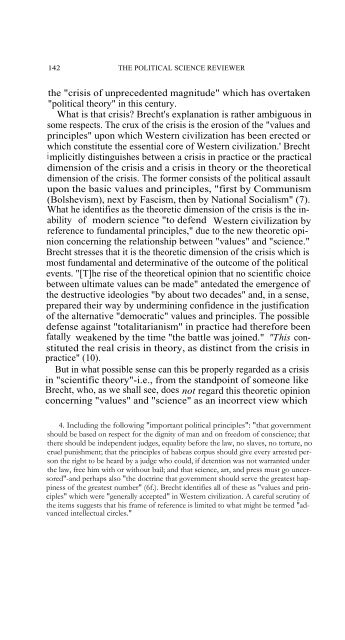ARNOLD BRECHT'S POLITICAL THEORY REVISITED Political ...
ARNOLD BRECHT'S POLITICAL THEORY REVISITED Political ...
ARNOLD BRECHT'S POLITICAL THEORY REVISITED Political ...
Create successful ePaper yourself
Turn your PDF publications into a flip-book with our unique Google optimized e-Paper software.
142 THE <strong>POLITICAL</strong> SCIENCE REVIEWER<br />
the "crisis of unprecedented magnitude" which has overtaken<br />
"political theory" in this century.<br />
What is that crisis? Brecht's explanation is rather ambiguous in<br />
some respects. The crux of the crisis is the erosion of the "values and<br />
principles" upon which Western civilization has been erected or<br />
which constitute the essential core of Western civilization.' Brecht<br />
implicitly distinguishes between a crisis in practice or the practical<br />
dimension of the crisis and a crisis in theory or the theoretical<br />
dimension of the crisis. The former consists of the political assault<br />
upon the basic values and principles, "first by Communism<br />
(Bolshevism), next by Fascism, then by National Socialism" (7).<br />
What he identifies as the theoretic dimension of the crisis is the inability<br />
of modern science "to defend Western civilization by<br />
reference to fundamental principles," due to the new theoretic opinion<br />
concerning the relationship between "values" and "science."<br />
Brecht stresses that it is the theoretic dimension of the crisis which is<br />
most fundamental and determinative of the outcome of the political<br />
events. "[T]he rise of the theoretical opinion that no scientific choice<br />
between ultimate values can be made" antedated the emergence of<br />
the destructive ideologies "by about two decades" and, in a sense,<br />
prepared their way by undermining confidence in the justification<br />
of the alternative "democratic" values and principles. The possible<br />
defense against "totalitarianism" in practice had therefore been<br />
fatally weakened by the time "the battle was joined." "This constituted<br />
the real crisis in theory, as distinct from the crisis in<br />
practice" (10).<br />
But in what possible sense can this be properly regarded as a crisis<br />
in "scientific theory"-i.e., from the standpoint of someone like<br />
Brecht, who, as we shall see, does not regard this theoretic opinion<br />
concerning "values" and "science" as an incorrect view which<br />
4. Including the following "important political principles": "that government<br />
should be based on respect for the dignity of man and on freedom of conscience; that<br />
there should be independent judges, equality before the law, no slaves, no torture, no<br />
cruel punishment; that the principles of habeas corpus should give every arrested person<br />
the right to be heard by a judge who could, if detention was not warranted under<br />
the law, free him with or without bail; and that science, art, and press must go uncersored"-and<br />
perhaps also "the doctrine that government should serve the greatest happiness<br />
of the greatest number" (6f.). Brecht identifies all of these as "values and principles"<br />
which were "generally accepted" in Western civilization. A careful scrutiny of<br />
the items suggests that his frame of reference is limited to what might be termed "advanced<br />
intellectual circles."
















